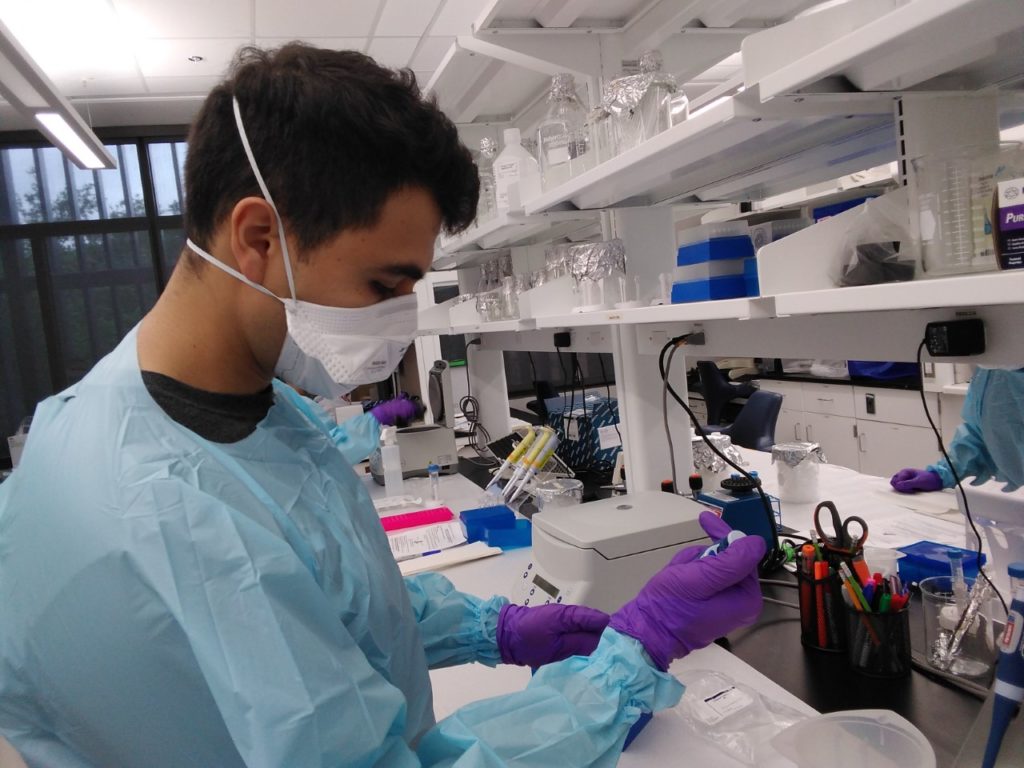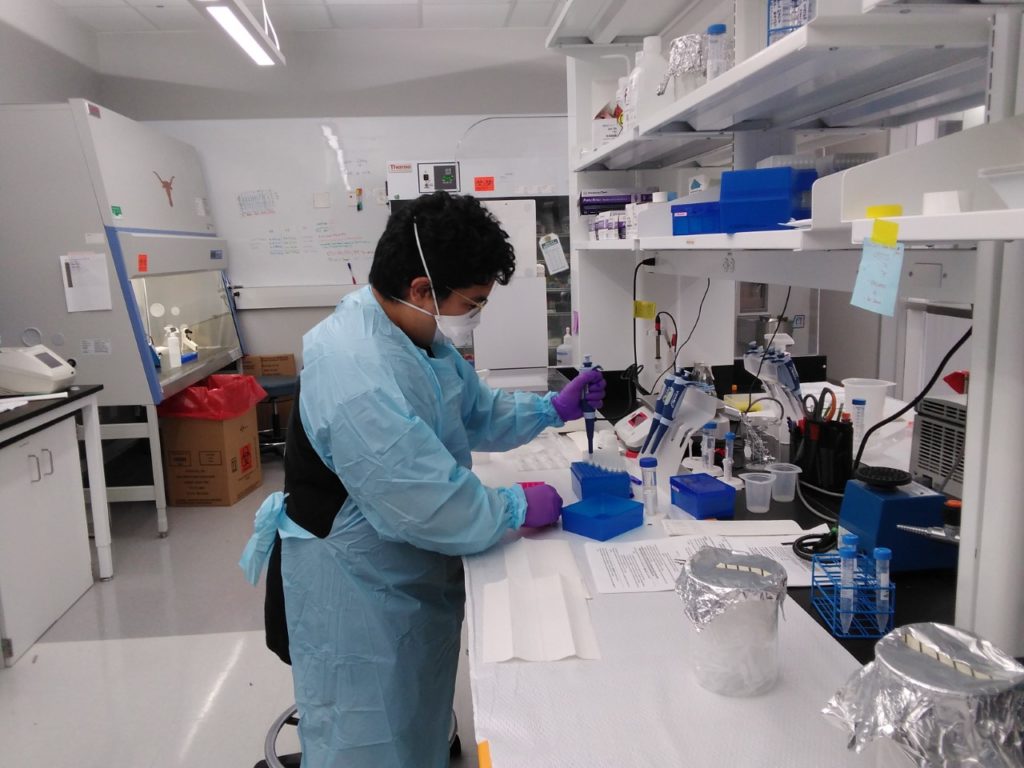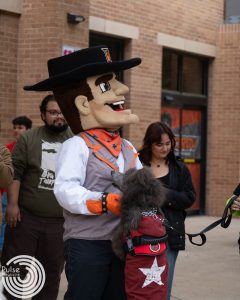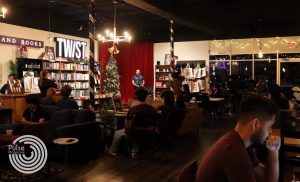Students, faculty work to test for the coronavirus
On March 12, Guy Bailey, the University of Texas Rio Grande Valley president, sent an email to the campus community announcing an extension of Spring Break from March 16-20, cancellation of university-hosted events, and a sudden change from on-campus learning to online. Instructors worked during that extended break to meet the change. Even with many of UTRGV’s buildings being closed and some services stopped, there are a few students and faculty still working to test for and research the COVID-19 virus in the Rio Grande Valley.

Eighteen Valley-native graduate students work in the virology lab, which studies viruses that come from mosquitos such as dengue fever and Zika. The students are from biology associate professors Christopher Vitek, Erin Schuenzel and John Thomas’ labs. The name of their team is the COVID-19 Diagnostic Task Force. Members of the group receive test samples from the School of Medicine’s drive-thru testing sites in Brownsville, Edinburg, Mercedes, and most recently, Harlingen. Their goal is to identify whether a case is positive or negative for coronavirus.
The students on the team are Juan Garcia Jr., Marisol Morales, Dionn Carlo Silva, Oscar Quintanilla, Eli Ruiz, Bridger Southwell, Kevin Gongora, Jonathan Kasofsky, Christopher Potter, Nathan Garza, Samantha Garcia, Heather Hernandez, Thalia Rios, Jeremy Marshall, Rachel Malampy, Xochitl Estrada, Victoria Decandia and Angela O’Neil.
Juan Garcia Jr. is the lab manager. He said he and the other students desired to help serve the community.
“We wanted to just get people results and we wanted to get them fast so we can figure out who are the ones that are positive and get them to the appropriate people,” Garcia Jr. said. “At the same time, we just wanted to calm people down and show them there’s a lot of negatives.”
Thomas credits Garcia Jr. for maintaining the lab. As a founding member of the lab, he started learning the protocols and how the equipment worked for a research lab. Six years later, he runs the production. The lab director met the Edinburg native during his first semester teaching at UTRGV.
The two connected while talking about viruses. This led to Garica Jr. working for the associate professor for several years. Now, the lab manager is scheduled to graduate in Fall 2020. He plans to continue his education and hopes to develop a vaccine.
Garcia Jr. compares working in the lab to being in the military due to the amount of pressure to stay ahead of tasks. He credits his Marine Corps experience for his preparedness; he served right after high school from 2009-2013.
“It took a long time for me to get here,” the former Marine said. “I know there’s a lot of undergraduates out there who think they’re not good. I want to tell those undergraduates [that] I wasn’t good either. My grades weren’t perfect. I wasn’t the smartest guy in the room. … If [you] just keep pushing forward and keep doing stuff that [you] want … eventually, [you’ll] be in a good spot.”
The lab director said the students are paid to work in the lab, either from scholarships or direct wages. He added they don’t work more than 12 hours per week since there’s enough staffing.
However, Garcia Jr. works 16 to 20 hours during the week. He coordinates plans for the following weeks, performs administrative work and thinks of ways to keep the lab moving.
For a while, Thomas wasn’t sure if the students could get paid. He nor the students are required to do this, especially since the students have classwork and he had courses to teach. Thomas said he’s from Austin, but the RGV is his home, much like the students.

Before the lab could test for COVID-19, Thomas worked with the state to receive the clinical laboratory improvement amendment (CLIA), which is a rigorous process of interviews to assure the individual is qualified for the license. This idea came to mind from Thomas and Vitek wanting a diagnostic testing lab; this is where procedures such as X-rays are done. Both professors pitched the idea to people from the newly opened school of medicine in December 2015 and received moral support. Thomas said the first dean, Dr. Francisco Fernandez, who was also the vice president of Medical Affairs, left before work could be done and another dean, Dr. John Krouse, who is also the vice president of Health Affairs, entered, which slowed progress for the lab.
However, Thomas and Vitek had grants from the Center for Disease Control and Prevention to research vector-borne viruses. Equipment was also purchased using the department’s available funds. These two factors allowed the lab to take root and unintentionally prepare for the COVID-19 crisis.
In mid-March, Thomas received a call from the UTRGV School of Medicine requesting help with packaging possible coronavirus specimens.
“You have to have a special license to [handle] these biological samples,” Thomas said.
What started with packaging samples, turned into testing for the virus.
“You look at how all these little things lined up and it’s like if we weren’t already in a position … doing all this testing for Zika and dengue, we wouldn’t have been [able to] rapidly respond to, ‘Hey can you test coronavirus for us?’” the lab director said.
Dr. Krouse said the benefit of having this lab in the RGV is being able to research and have a clinical reference lab/diagnostic lab in short range.
“One of the advantages of having a large university like UTRGV is you have all these various components that are skilled in this entire spectrum of activities,” Dr. Krouse said. “It’s very easy for us to build together [to] take care of the needs of the community.”
According to Dr. Krouse, the drive-thru testing sites perform 130 tests per day, totaling to 2,000 tests. He added there is no fee to get tested but mentioned insurance can pay for the test. The testing kits are made at the School of Medicine and roughly cost $15.
As testing sites have expanded across the Valley, the dean said this will allow the School of Medicine and the virology lab to find out who’s been infected with the coronavirus and see if they have immunity to it. Dr. Krouse added that he hopes to begin antibody testing in early May.
“Most young people will get little to no symptoms,” he said. “They have a cough for a day or two; they may have nothing at all. [You may have] been exposed, you cleared it very quickly and you have immunity now.”
Testing can also be done in other UT Health RGV clinical sites such as employee clinics, student health centers and other private offices.
According to Dr. Krouse, if a case turns out positive, the patient is contacted and the county health department is informed, as required. The patient is advised to be under a doctor’s care from the university. If they have a private physician, they are asked to seek further evaluation from them. Questions will be asked regarding exposure. Lastly, patients will be told to self-isolate or seek medical care if suffering from severe symptoms.
The drive-thrus have several personnel stationed at the testing sites. Most days are hot and there is little to no wind. What protects these people is a white canopy and several large metal fans, there’s also water bottles. Some are volunteers from the School of Medicine, nursing and social work, UT Health employees who have the authority to issue tests, and University Police. To assure safety, those who work directly with patients wear N95 masks, full personal protective equipment, plastic face shields, gloves and medical gowns.
Some community entities have expressed their gratitude for the work being done. For example, H-E-B donated 300 meals to the drive-thru testing sites and other food and drink vendors donated as well, Dr. Krouse said.
As of publication, there are eight testing sites in the RGV listed Texas Department of Public Safety and Department of State Health Services’ Texas COVID-19 Test Collection Sites map.
In Brownsville, the UT Health RGV site is located on One West University Blvd. To set an appointment, call 1-833-UTRGVMD. To contact the Valley Med Urgent Care site on 1000 Sports Park Blvd., call 1-833-887-4863.
To contact the UT Health RGV site located on 1201 West University Drive in Edinburg, call the same number as the Brownsville site. Additionally, the Family First Medical Center site, is located on 2046 McColl Road, where testing costs $250. For more information on the site, call 393-2200.
Valley Med Urgent Care also has a site on 101 East Expressway 83 in McAllen. Its number is 731-6699. Lastly, the Starr County COVID-19 Testing Center at the South Texas College campus on 142 FM 3167 in Rio Grande City is available to call at 488-8181.
There are two mobile testing sites. One on 419 FM 3168 in Raymondville and another on 450 Sixth St in Roma. For more information on these sites, call 512-883-2400.
To volunteer at the UT Health RGV drive-thrus, call 1-833-UTRGVMD.
Dr. Krouse recommends the community stays patient, practices social distancing as “the time will come when we’re going to be able to relax a bit.”
Thomas also hopes to speak with local representatives such as Congressman Vicente Gonzalez about the need to get money and support to maintain lab work from the State of Texas.
He spoke last year before state Legislature to request funding for UTRGV to make improvements in the diagnostic lab, but the bill did not get approved.
“Now that it’s a year later and everyone had a chance to see what something like this can do to the economy and the people, the state can reconsider and say, ‘OK, let’s go ahead and give UTRGV a permanent chunk of money from the state budget every year to do this diagnostic testing,’” Thomas said.





